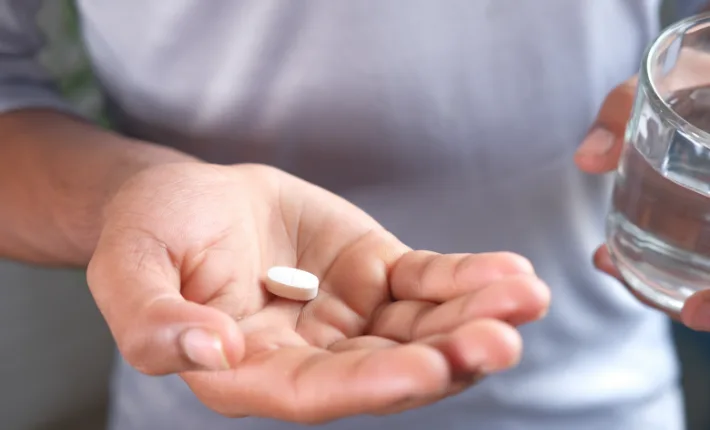Premenstrual Dysphoric Disorder (PMDD) & PMS: How Are They Different?

Every month, a not-so-loved visitor meets you right before your periods. It brings mood swings, fatigue, bloating and much more! Yes, we’re talking about PMS. Most of the time, the PMS symptoms, both physical and emotional, are manageable. But in some cases, they can get severe to a point where one feels depressed, anxious and hopeless about life. When the symptoms start affecting your day-to-day life, your body undergoes premenstrual dysphoric disorder (PMDD).
- What Is The Meaning Of PMDD?
- Premenstrual Dysphoric Disorder Symptoms
- PMDD Causes
- PMDD Diagnosis
- PMDD Treatment
The premenstrual dysphoric disorder is known to notoriously mimic the PMS symptoms. This makes it difficult to understand what you are dealing with. Before you start overthinking, let us guide you towards the meaning of PMDD, its symptoms, and PMDD treatment options. While we go through these details, you would understand how premenstrual dysphoric disorder differs from PMS.
What Is The Meaning Of PMDD?
The meaning of PMDD is premenstrual dysphoric disorder. It’s a severe and more serious form of PMS. This disorder tends to cause depression, anxiety and serious mood swings. The severity of this disorder is such that some women with PMDD may get suicidal thoughts. If you do find yourself having such thoughts, please seek immediate medical attention and help.
Premenstrual Dysphoric Disorder Symptoms

One might experience premenstrual dysphoric disorder symptoms a week or two before they menstruate. These symptoms ease out in a few days as your periods begin.
Here are some of the common symptoms that overlap PMS and PMDD:
- Bloating
- Tenderness in breasts
- Fatigue
- Trouble sleeping
- Headaches
- Nausea
- Muscle pain
- Painful periods
- Diarrhoea
- Change in appetite
In addition to these, premenstrual dysphoric disorder also covers some extreme symptoms such as,
- Feeling of hopelessness
- Severe anxiety
- Depression
- Intense anger or irritability
- Crying spells
- Feeling out of control
- Panic attacks
- Forgetfulness
PMDD Causes
It’s said that genetics and hormonal levels are some factors causing the condition. However, there isn’t any scientific backing to it. The real reason behind this disorder is yet to be found. Research suggests that stress can cause and make this disorder even worse.
PMDD Diagnosis
The diagnosis of PMDD consists of your medical history, your PMDD symptoms and a physical exam. Your doctor is likely to ask you about your symptoms, when they occur, how long they last and the intensity of each symptom. He will also make sure that underlying emotional problems like depression and anxiety aren’t the triggering PMDD symptoms.
The condition will get diagnosed if,
- You experience at least five premenstrual dysphoric disorder symptoms
- They tend to disrupt your daily life
- They begin a week or two before period
- They clear up within a few days as you start menstruating
PMDD Treatment
Depending on the intensity of your PMDD symptoms, your doctor will advise you whether it requires treatment or not. In mild cases, lifestyle changes like quality sleep, exercise, a balanced diet and practising meditation to reduce stress can help.

When it comes to severe cases, here are a few premenstrual dysphoric disorder treatments that can ease the symptoms:
1. Antidepressants :
Doctors tend to prescribe antidepressants to ease the emotional symptoms of PMDD.
2. Birth control pills :
If your doctor has prescribed you these pills, they help in reducing muscle aches and back pain caused by PMDD.
3. Over-the-counter pain relievers :
As headaches, breast tenderness and cramps are a part of this disorder, taking OTC pain relievers can help. Make sure to consult a doctor before taking any medications.
4. Vitamin supplements :
It’s seen that vitamin supplements reduce symptoms of PMDD. But before consuming, you should ask your doctor whether these supplements are suitable for you or not.
When To Visit A Doctor

You should consult a doctor immediately in case you experience any of the following instances:
- Panic Attacks
- Extreme anxiety
- Having suicidal thoughts
- Severe depression
- Uncontrollable anger
Takeaway
Remember that PMDD symptoms will ease out as your periods arrive. During this time, it’s important to have the best menstrual care by your side. For sanitary pads users, the ALWAYS Cotton Soft Pads are an ideal option. They come with a comfortable top sheet and an innovative soft design that provides cushiony soft comfort. It also has unique Flexi wings that keep your pad in place.
If you love using tampons, then the ALWAYS Tampax Cardboard Tampons are a great pick. These have a unique absorbent core that soaks the liquid and minimises the risk of leakage. You can find them in different variants for optimal absorbency.
Dealing with premenstrual dysphoric disorder symptoms can be tough. But remember that you aren’t alone in this. Talking to your doctor or a therapist can be of great help. Additionally, you can also reach out to some support groups. It’s important to speak up and vent your feelings instead of going through extreme emotions alone.
Read more about period symptoms and what causes period pains.
Stay well prepared for your next period by tracking it on Always Period Calculator.
Try our ovulation date calculator to track your days and plan your fertility window.
FAQs
1. Who is prone to getting premenstrual dysphoric disorder?
Women with a case of anxiety or depression, or even with a family history of PMS or PMDD can be prone to getting the premenstrual dysphoric disorder.
2. How does PMDD make you feel?
PMDD can make you feel extremely irritable. In some cases, one might experience episodes of anxiety and depression too. Thus, it’s important to consult a doctor at the earliest, as soon as you start experiencing such symptoms.
3. Does PMDD go away after menopause?
Yes, PMDD tends to go away after menopause. It’s because as you don’t menstruate and your hormones level out, you don’t experience any mood swings or other associated symptoms.
Disclaimer:
Please note the date of the last review or update on all articles. No content on this site, regardless of date, should ever be used as a substitute for direct medical advice, diagnosis or treatment from your doctor or other qualified clinician. Always is committed to ensuring that all of our products meet rigorous safety standards; Always pads prioritize safety, protection and comfort of its consumers.




